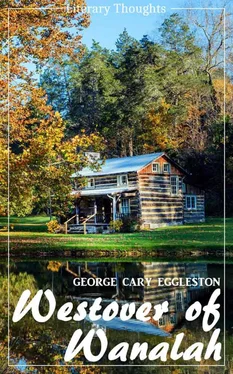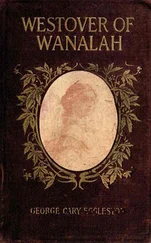Westover of Wanalah by George Cary Eggleston
Literary Thoughts Edition presents
Westover of Wanalah,
by George Cary Eggleston
Transscribed and Published by Jacson Keating (editor)
For more titles of the Literary Thoughts edition, visit our website: www.literarythoughts.com
All rights reserved. No part of this edition may be reproduced, stored in retrieval system, copied in any form or by any means, electronic, mechanical, photocopying, recording or otherwise transmitted without written permission from the publisher. You must not circulate this book in any format. For permission to reproduce any one part of this edition, contact us on our website: www.literarythoughts.com.
This edition is licensed for your personal enjoyment only. It may not be resold or given away to other people. If you would like to share this book with another person, please purchase an additional copy for each recipient. If you’re reading this book and did not purchase it, or it was not purchased for your use only, then please return to Amazon and purchase your own copy of the ISBN edition available below. Thank you for respecting the efforts of this edition.
CHAPTER I – PERIL AND PASSION
One midsummer morning in the late eighteen-fifties, Boyd Westover of Wanalah was riding along a Virginia plantation road, accompanied by half a dozen hounds, for whose discipline and restraint he carried a long, flexible black-snake whip. The weapon played the part of sceptre rather than that of sword. The young man had no intention of striking the dogs with it, but whenever their exuberance broke bounds he cracked the lash in air, making a report like that of a pistol shot, and the reminder of his authority was quite sufficient for purposes of canine discipline.
He was not hunting. He was merely riding to a distant part of the plantation he controlled, to inspect the work of the negroes there and to give directions for its proper doing. But he liked the company of his dogs and enjoyed their mad relish of the morning.
The glory of it gladdened his own spirit in spite of the vexing problems that were never quite absent from his mind.
Boyd Westover, a young man of not more than twenty-three or twenty-four years, had never known a serious care until the spring of that year. Then a burden of responsibility had fallen upon him that threatened to bend even his broad shoulders beneath its weight.
His father had died suddenly in the early spring, leaving a widow and this one son who in the ordinary course of affairs became administrator of the estate and master of the plantation.
Then it was that the burden fell upon him. The plantation was an unusually large one, and its late owner had been accounted the richest man in all the region round about, just as his forbears for generations past had been. Wanalah, the ancestral seat of the family, had been for two hundred years the home of a hospitable, high living, high mettled race of men and women, but during the reign of Boyd Westover's father the hospitality of Wanalah had outdone itself in lavishness. There were always guests in numbers there, and a multitude of servants were withheld from profitable industry to minister to their comfort. There were thoroughbred horses enough in the stables to mount half a company of cavalry, and a like profusion was apparent in the case of every other provision for enjoyment and the unstinted entertainment of guests. In brief the late master of Wanalah had kept open house for all gentlemanly comers.
But when Boyd Westover took his degree at the University in early June and returned to Wanalah to assume his duties as administrator, he learned for the first time that the plantation had not been earning the cost of all this high living. There was not only the hereditary debt upon the place—a debt that so great a plantation, wisely conducted, might have borne comfortably—but added to it was a confused mass of fresh debts accumulated during his father's lifetime and in consequence of his extravagance.
The entertainment of pleasure-seeking guests was suspended now, of course, during the period of mourning, and in view of the ill health into which his mother had fallen since the shock of his father's sudden death, the suspension seemed likely to endure for a long period to come.
In the meantime Boyd Westover was both perplexed and appalled by the magnitude of the problem he was set to solve. For a time he doubted even the solvency of the estate, but later reckonings had shown him that this fear was not justified, though the fact brought small relief to his mind, for peculiar reasons connected with the character of the property itself. If he might have sold out everything, he could have paid off all the debts, leaving a small but sufficient competency for his mother's support. As for himself, he gave no thought for the future. He was young, strong and fit to meet fate unarmed.
But he could not sell the property without unpardonable offence to his own soul and to the sentiment of the community which was to him the world. For by far the greater part of that property and altogether the most salable part of it consisted of the negroes, every one of whom had been born on Wanalah plantation as their parents and grandparents and great-grandparents had been before them. Among the high class Virginians—the class to which Boyd Westover belonged by immemorial inheritance—it was held to be a shamefully impossible thing to sell a negro except for incorrigible crime, or for the purpose of bringing a man and wife together, on one plantation.
"I simply will not sell the servants," the young man said to himself when matters seemed at their worst. "Rather than do that, I'll run them all off north, set them free and let the estate fall into bankruptcy."
Since that time the young man's close study of the situation had convinced him that neither of these courses was necessary. By cutting down the force of house servants to the measure of his own and his mother's modest needs, and putting every able-bodied negro at profitable work in the crops, he was confident that he could make the plantation carry its load of debt and slowly reduce it.
That was now his task, and in spite of the glory of the midsummer morning his mind was busy planning ways and means, when suddenly a combined baying from the hounds arrested his attention. Looking up he saw a young woman on horseback in a pasture not far ahead—a young woman in difficulty and sore danger.
Streamers of flaming red—the reason for which he could in no wise guess—were flying from her shoulders and a maddened bull of huge bulk was charging her with the fury of a bovine demon.
Instantly the young man plunged the rowels into the flanks of his horse. An eight-rail fence lay in his way, but there was no time in which to throw off even one of its rails. Without a thought of pause he urged his horse toward it at the top of his speed, determined to force him over it or through it as the case might be. The weight of the steed and the speed at which he was moving would be sufficient, Boyd Westover thought, to crush a way through the barrier. It was likely to cost the beautiful animal his life, but what of that? There was another life at stake, in rescue of which the young man was ready to sacrifice even his own—for the life in peril was that of the woman he loved, the woman who had awakened all the passion, all the tenderness, all the chivalry of his brave young soul. To save her he would have doomed any and every other living thing to cruel death.
The horse he rode seemed to realize the perilous choice his rider was forcing upon him and to choose the safer but far more difficult course. Putting forth all his superb strength in utmost endeavor, he cleared the barrier at a flying leap.
Читать дальше












